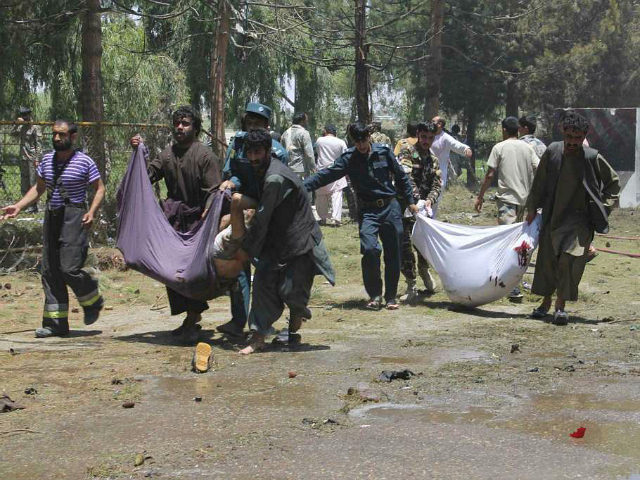Taliban jihadists launched a car bomb attack in their southern Afghanistan stronghold located along the Pakistan border, Helmand province, killing at least 30 people and wounding more than 60 others, according to the provincial governor’s office.
The Taliban terrorist group controls or influences more than 60 percent (nine of 14 districts) of Helmand, considered one of the deadliest provinces in the ongoing 16-year-old war for the U.S.-led coalition, according to the U.S. military.
On Thursday, a suicide car bomb targeted Afghan soldiers, government employees, and other civilians waiting to collect their monthly salaries at the New Kabul Bank in the capital of the restive Helmand province.
The Taliban claimed responsibility for the attack, marking the latest deadly incident in Afghanistan during the ongoing Islamic holy month of Ramadan.
In condemning the attack, Afghan President Ashraf Ghani said the perpetrators “have no respect for any religion or faith. They are enemies of humanity.”
The casualty estimates vary.
Omar Zawak, a spokesman for the governor of Helmand, indicated that “30 people had been killed and more than 60 injured, many critically,” reports the Guardian.
Meanwhile, the trauma center in the provincial capital Lashkar Gah said it received 23 bodies and admitted 43 injured patients.
Most of the deaths were soldiers, revealed Zawak.
Opium-rich Helmand is located along the Pakistan border, next to Kandahar province, the birthplace of the Taliban.
Helmand remains the top opium-producing province in Afghanistan, the world’s chief supplier of the poppy crop and its heroin derivative, revealed the latest assessment from the United Nations.
The Taliban generates about 60 percent of its funding for terrorist activities from the illicit drug.
Referring to Thursday’s attack, the Guardian notes:
It is the third time in three years that militants have targeted crowds collecting salaries at the [New Kabul] bank. A suicide bomber and a gunman killed 10 people in 2014, and seven were killed in a suicide bombing in February. The Taliban claimed responsibility for both attacks.
This year, about 300 U.S. Marines returned to Helmand for the first time since 2014.
By the time former President Barack Obama announced an end to the American combat mission in December 2014 and pulled out most U.S. service members out of the country, his administration had declared Helmand province to be secure.
Taliban jihadists have since made a significant comeback and now control more territory than during any other time since the United States removed the group from power in 2001.
The terrorist organization controls or contests about 35 percent of Afghanistan, according to the latest assessment from the Pentagon.
President Donald Trump’s administration has decided to escalate the war in response to the deteriorating security conditions in Afghanistan he inherited from his predecessor.
The U.S. is expected to deploy in additional 4,000 U.S. troops to join the 8,400 already in Afghanistan.
Although the United States is “not winning” the war in Afghanistan, “we will correct this as soon as possible,” U.S. Defense Secretary James Mattis told lawmakers this month.
In the Trump administration’s first semi-annual report focused on progress in Afghanistan, the Pentagon insisted that alleged U.S. ally Pakistan continues to knowingly provide sanctuary to the Taliban and other terrorist groups, including the al-Qaeda-affiliated Haqqani Network.
Most terrorist attacks against the U.S. military, its Afghan counterpart, and civilians take place in provinces that border Pakistan such as Helmand and Kandahar.
“The region with the most districts under insurgent control or influence is centered on northeastern Helmand Province and northwestern Kandahar Province, and includes the Helmand/Kandahar border area, Uruzgan Province, and northwestern Zabul,” reported the Special Inspector General for Afghanistan Reconstruction (SIGAR) this year.

COMMENTS
Please let us know if you're having issues with commenting.